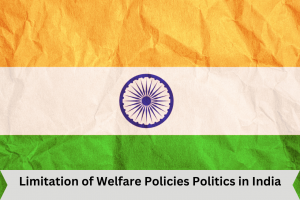ForumIAS announcing GS Foundation Program for UPSC CSE 2025-26 from 19 April. Click Here for more information.
ForumIAS Answer Writing Focus Group (AWFG) for Mains 2024 commencing from 24th June 2024. The Entrance Test for the program will be held on 28th April 2024 at 9 AM. To know more about the program visit: https://forumias.com/blog/awfg2024
Source-This post on Limitation on Welfare Policies Politics in India has been created based on the article “Welfare is on the agenda of all political parties. But is it adequate” published in “The Indian Express” on 28 March 2024.
UPSC Syllabus-GS Paper-2– Welfare Schemes for Vulnerable Sections of the population by the Centre and States and the Performance of these Schemes.
Context– According to the ILO’s World Social Protection Report, 2022, India spends too little on social protection. This is a matter of great concern as 90 per cent of the workforce in India works in informal sector with no or little social protection. Limitation of Welfare Policies Politics in India
What are some of the important welfare schemes started by the Centre and States especially for women?
As per Crisil report 2023, the share of the economy (gross state domestic product) devoted to social welfare expenditures has increased from 1.2-1.3 % on average in 2017-18 to about 1.6 % in 2022-23 in 11 states.
Women have assumed great importance in the social protection architecture of states. There are various welfare schemes which cover education expenses, free public transport, subsidized LPG, and direct cash transfer.
1) Mahtari Vandan programme.- Chhattisgarh has announced this scheme.
2) Ladli Behna scheme –This has been started by Madhya Pradesh government. Under it, Rs 1,250 per month was given to poor women beneficiaries.
3) Kalaignar Magalir Urimai Scheme– This has been started by Tamilnadu. Under it,Rs 1,000 is transferred per month to women above the age of 21 with a household income of less than Rs 2.5 lakh.Similarly,there are schemes such as Mahalakshmi and the Gruha Lakshmi cash transfer programmes for women in Telangana and Karnataka respectively.
4) Ujjwala scheme -The Central government has started this scheme to provide subsidized LPG gas cylinders to poor women. The scheme has now been extended till February 2025.
5) PM Jan Dhan Yojna-During Covid pandemic, the central government has transferred 3 instalments of Rs 500 each to women holding Jan Dhan Yojana bank accounts.
What is the significance of these welfare schemes for women?
Along with ensuring political dividends, it is also good economics. As per some studies, cash transfers to women have increased the proportion of expenditure on items of basic consumption and education. This benefits households and has positive implications for women’s empowerment.
What are the issues with these welfare schemes?
1) Paternalistic approach-These welfare schemes are not rights-based schemes. They do not have any legal backing and are rather rooted in paternalism. Here, women are only seen as beneficiaries or recipient. This hinders their actual empowerment.
2) Lack of political competition within states-States with one political party domination do not have incentive to introduce fresh programmes or effectively implement existing schemes. Whereas in states, where there is stiff political competition and regular change of power, the welfare schemes are rejigged rather than withdrawn.
3) Lack of inclusiveness– The social protection architecture in India is chaotic. It’s unbalanced as groups like the very young and the old, who do not constitute the majority voters, are often overlooked.
According to the United Nations Declaration of Human Rights, social security is a human right. Thus, there is an urgent need to pay heed to ILO’s Recommendation of 2012 that has called for all nations to institute a social protection floor.
Question for practice
Enlist some of the important welfare schemes run by states to ensure women empowerment. Also, highlight the problems associated with welfare schemes?





